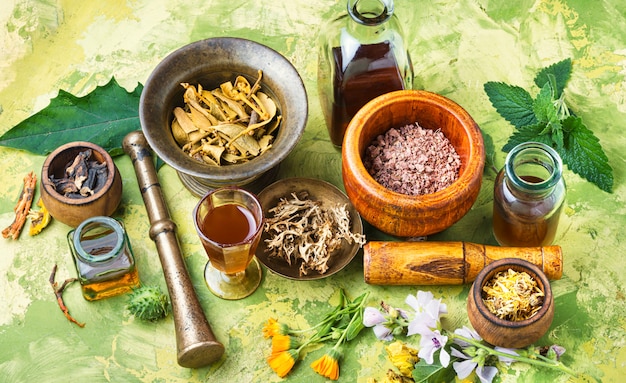Herbal supplements have been used for centuries as natural remedies to support health and well-being. Derived from various plant parts, such as roots, leaves, and flowers, these supplements offer a wide range of potential benefits. In this comprehensive article, we will explore the advantages of herbal supplements and delve into the importance of ensuring their safety and effectiveness.
The Power of Nature: Benefits of Herbal Supplements
- Natural Nutrients: Herbal supplements are rich in natural vitamins, minerals, and antioxidants that can enhance overall health. For example, Turmeric contains curcumin, a potent antioxidant with anti-inflammatory properties.
- Support for Specific Health Concerns: Different herbs have been traditionally used to address specific health issues. For instance, Echinacea is known for its immune-boosting properties, while Ginger is commonly used for digestive support.
- Reduced Side Effects: Compared to synthetic medications, herbal supplements often have fewer side effects, making them a preferred option for some individuals.
- Improved Digestion: Certain herbs, like Peppermint and Aloe Vera, can aid digestion and alleviate gastrointestinal discomfort.
- Stress Relief: Herbal supplements like Ashwagandha and Chamomile are known for their calming effects, helping to reduce stress and anxiety.
- Enhanced Sleep: Valerian root and Passionflower are popular herbal remedies to promote better sleep and combat insomnia.

Ensuring Safety: Quality and Regulation
While herbal supplements can offer significant benefits, it is essential to ensure their safety and efficacy. Unlike prescription drugs, herbal supplements are not regulated as strictly by government agencies. Therefore, consumers should exercise caution when purchasing and using these products.
- Choose Reputable Brands: Purchase herbal supplements from well-established and reputable brands that adhere to good manufacturing practices.
- Read Labels Carefully: Check the label for ingredients, dosage instructions, and potential allergens or contraindications.
- Consult with a Healthcare Professional: Before starting any new supplement regimen, consult with a healthcare professional, especially if you are pregnant, nursing, or taking medications.
- Be Informed: Do thorough research on the specific herb and its potential interactions with medications or medical conditions.
- Avoid Unproven Claims: Be wary of supplements claiming to cure or treat serious medical conditions without sufficient evidence.
- Look for Third-Party Testing: Some brands undergo third-party testing for quality and potency, which provides an additional level of assurance.
Popular Herbal Supplements
- Ginkgo Biloba: Known for its potential to improve memory and cognitive function.
- Ginseng: May enhance energy, endurance, and mental clarity.
- Garlic: May support heart health and immune function.
- Milk Thistle: Often used to promote liver health and detoxification.
- St. John’s Wort: Traditionally used for mood support and managing mild depression.
Are there any side effects of Herbal Supplements
While herbal supplements are generally considered safe when used appropriately, they are not without potential side effects. As with any medication or supplement, individual responses may vary, and some individuals may experience adverse reactions. It’s essential to be aware of the possible side effects and exercise caution when using herbal supplements.
Common side effects of herbal supplements may include
Allergic Reactions: Some people may be sensitive or allergic to certain herbs, leading to skin rashes, itching, or respiratory issues.
Digestive Upset: Certain herbs can cause gastrointestinal discomfort, such as nausea, diarrhea, or indigestion.
Interaction with Medications: Herbal supplements can interact with prescription medications, potentially reducing their effectiveness or causing adverse effects.
Blood Clotting: Some herbs, like Ginkgo Biloba and Garlic, may interfere with blood clotting and increase the risk of bleeding.
Hormonal Effects: Certain herbs, such as Dong Quai and Black Cohosh, may have hormonal effects, which can be problematic for individuals with hormone-related conditions.
Liver Toxicity: Prolonged or excessive use of certain herbal supplements may lead to liver toxicity.
Pregnancy and Breastfeeding: Some herbal supplements are not safe for use during pregnancy or breastfeeding and may pose risks to the fetus or infant.
To minimize the risk of side effects, it’s crucial to follow recommended dosages, purchase products from reputable brands, and consult with a healthcare professional before starting any new herbal supplement regimen. If you experience any unexpected or concerning side effects while using herbal supplements, discontinue use and seek medical advice promptly.
Herbal Supplements and Drug Interactions
It is crucial to be aware that herbal supplements can interact with prescription medications. Some interactions can reduce the effectiveness of the medication, while others may cause adverse effects. Always inform your healthcare provider about any herbal supplements you are taking to avoid potential interactions.

Conclusion
Herbal supplements offer a natural and potentially beneficial way to support health and well-being. With a wide range of options available, individuals can find herbal remedies that suit their specific needs and health concerns. However, it is vital to prioritize safety by purchasing from reputable sources, being well-informed, and consulting with a healthcare professional when necessary. By incorporating herbal supplements wisely, individuals can harness the power of nature to enhance their overall wellness.









